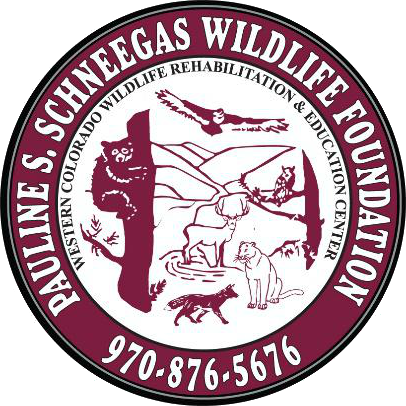I've found a Baby bird...what do i do?
Please consult with a licensed wildlife rehabilitator, Colorado Parks and Wildlife (CPW) officer, or animal control officer before intervening!
Under Colorado law, it is illegal to possess any species of wildlife without a license. This is where licensed rehabilitators like us come in! In addition to being licensed to take care of wildlife, we have the ability to provide injured and orphaned wildlife with the best nutrition, appropriate medical care, and are usually able to pair them with their own kind so they can thrive and learn proper behaviors for their species.
It is legal, however, for the general public to capture an injured wild animal and transport it to a willing veterinarian, CPW, or licensed rehabilitator.
PLEASE DO NOT FEED ANY WILDLIFE, ESPECIALLY BABIES, UNLESS A REHABILITATOR INSTRUCTS YOU TO DO SO. online sites will give you diets to feed various wildlife, and many of these are extremely harmful! FEEDING WITH IMPROPER METHODS OR INAPPROPRIATE FOODS CAN LEAD TO THE DEATH OF THE ANIMAL.
If you have fed an animal before bringing it to us, please let us know so we can take appropriate measures on intake.
Does this Bird need rescue?
Songbirds
Hatchlings and nestlings are baby birds that have not yet left the nest. Hatchlings have very few or no feathers and are barely able to hold their head up. Nestlings have fuzzy feathers (they may have some adult feathers growing in), and are not able to stand/perch on a branch or your finger.
If a hatchling or nestling has fallen from its nest and appears uninjured, it is best to get it back to its parents. Though we all grew up hearing it, it is a myth that a mother bird will reject the baby if it smells like humans. Birds do not have a good sense of smell and will usually continue to care for the baby even if it has been handled. If you know where the nest is located, you may return the baby to the nest with its siblings and monitor for the rest of the day to see if the parents return.
Nestlings
Nestlings like these are missing feathers, have fuzzy feathers on their heads, and are unable to stand up on your finger or a perch. If they are orphaned and you can't return them to their parents, they will need to be brought to a rehabilitator.
If the nest is inaccessible, or you don’t know exactly where it’s located, you can create a surrogate nest and tie it in a tree near where you think the original nest is or was. In most cases, the parents will continue to feed the baby even if it’s in a new place. Observe the baby for the day to determine if the parents are taking care of it. If not, give us a call!
To make a nest:
To make a surrogate nest, use a basket, box, or storage container that can be tied in the tree. Make a nest out of tissue, paper towels, or fabric. The nest itself should only be 3-4 times the size of the baby bird.
Fledglings are baby birds that have grown most of their adult feathers (though they may have a few fuzzy feathers left), and can stand or perch on branches or your finger. These guys have left the nest to learn how to fly. They often spend a few days on the ground while they practice. Unless it is obviously injured, a fledgling DOES NOT need to be rescued. Its parents will continue to feed it, and it will hop around until it can fly fully. If you have fledglings in your yard, it’s best to try to keep your household pets away from the area they are in until they can safely fly away.
Fledgelings
A fledgling bird, like this Cedar Waxwing, can stand on your finger or a branch and has all or most of its adult feathers. Unless injured, it needs to be left alone so it can learn to fly!
If you are certain that the bird is orphaned or in need of rescue, please contact your local wildlife rehabilitator for assistance and advice. It is important to get the bird to a rehabilitator as soon as possible - birds are very sensitive and need professional care. Contact your local rehabilitator before trying to feed the baby, many baby birds need very specific diets and can be easily killed by improper feeding techniques.
Waterfowl
Young goslings are gray and yellow with no distinct differentiation between the colors. They will often follow nearly anything that moves. If a mother goose can be found nearby (even if it’s not the original mother), the baby can be "floated" to her to join the family!
Mallard ducklings have a distinctive line through their eyes. Mother ducks will not accept other babies, so ducklings need rescue more often than goslings do. Ducklings stress very easily, so capturing them as quickly and efficiently as possible is key to their survival. They should then be put in a dark, quiet place until you can get them to a rehabilitator.
Help keep animals like baby birds safe by keeping your cats indoors during baby season! Roaming cats are dangerous predators and account for more bird deaths annually than all other predators combined!
Useful Contacts:
PSSWF
(970) 896-6895 (call or text)
psswildlifefoundation@gmail.com
Pitkin County Animal Control Dispatch
970-920-5300
CPW - Canyon Creek Office
(970)-947-2920
CPW - Grand Junction Office
(970) 255-6100
CPW - Meeker Office
(970) 878-6090
CPW - Hot Sulphur Springs Office
(970) 725-6200






